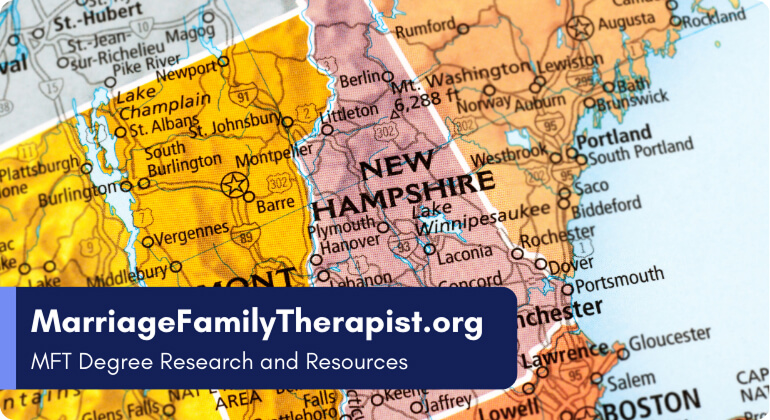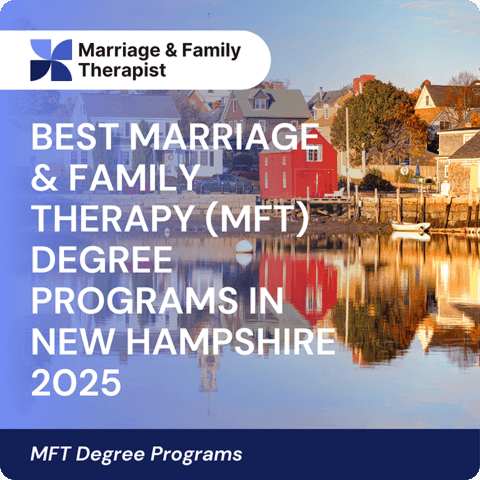Best Marriage & Family Therapy (MFT) Degree Programs in New Hampshire 2025
New Hampshire provides limited in-state options for COAMFTE-accredited MFT programs, but students can still pursue regionally accredited programs that align with licensure requirements. With a rising demand for mental health professionals, particularly in rural areas and school-based counseling programs, LMFTs play a crucial role in strengthening family support services and behavioral health care across the state.
In this guide
2026 Best Marriage & Family Therapy (MFT) Programs in New Hampshire
University of New Hampshire
Durham, NH - Public 4-Year - unh.edu
Master's - Marriage and Family Therapy
Campus Based - Visit Website
The University of New Hampshire-Main Campus offers a COAMFTE-accredited master's program in Marriage and Family Therapy that prepares students for clinical practice through 500 supervised clinical hours. This campus-based program features nationally recognized faculty who emphasize systemic therapeutic approaches for treating individuals, couples, and families. Students benefit from a collegial learning environment with competitive stipends and campus clinical facilities. The program boasts a 97% graduation rate and 100% national exam pass rate, with an application deadline of January 15. While entrance exam requirements are not specified in the provided data, prospective students should verify current admission criteria directly with the university.
- COAMFTE fully accredited program
- Two-year master's degree
- 500 clinical practice hours
- Nationally recognized faculty
- Competitive stipends available
- Campus-based clinical facilities
- Application deadline January 15
- Located in Durham, NH
- 97% graduation rate
- 100% national exam pass rate
Plymouth State University
Plymouth, NH - Public 4-Year - plymouth.edu
Graduate Certificate - Marriage and Family Therapy
Campus Based - Visit Website
Plymouth State University's Marriage and Family Therapy Master's program develops skilled clinicians through rigorous coursework and extensive hands-on training, emphasizing a comprehensive family systems approach. Students master advanced therapeutic techniques and gain practical experience, preparing them for licensure and effective practice with diverse families. This program requires an entrance exam for admission, focusing on professional clinical development and nuanced intervention strategies to address complex relational dynamics.
- Master of Science degree
- Professional clinical training
- Pathway to licensure
- Comprehensive family systems approach
- Advanced therapeutic techniques
University of New Hampshire College of Professional Studies Online
Manchester, NH - Public 4-Year - cps.unh.edu
Master's - Marriage and Family Therapy
Campus Based - Visit Website
The University of New Hampshire's Marriage and Family Therapy Master's program delivers comprehensive clinical training through its COAMFTE-accredited curriculum. This rigorous two-year program requires 72 credits and includes 500 clinical practice hours, preparing graduates for diverse therapeutic settings. Students benefit from nationally recognized faculty mentorship, a 100% national exam pass rate, and competitive stipends. The program emphasizes multicultural sensitivity and offers research opportunities, fostering advanced skills in treating individuals, couples, and families. An entrance exam is required for admission.
- COAMFTE Fully Accredited Program
- Two-Year Master's Degree
- 500 Clinical Practice Hours
- 72 Total Credit Requirements
- Nationally Recognized Faculty
- 100% National Exam Pass Rate
- Comprehensive Clinical Training
- Multicultural Sensitivity Focus
- Research and Publication Opportunities
- Competitive Stipend Options
Antioch University-New England
Keene, NH - Private 4-year - antiochne.edu
Graduate Certificate - Post-Master’s Certificate in Couple and Family Therapy
Campus Based - Visit Website
Antioch University-New England's Post-Master's Certificate in Couple and Family Therapy enables mental health professionals to deepen their expertise in systemic therapy approaches. This 27-30 credit program combines online coursework with essential residency components, offering flexibility for working professionals with completion options spanning 3-10 semesters. At $840 per credit, the program emphasizes individualized planning to meet diverse state licensure requirements. Notably, no GRE is required for admission, making it accessible for career advancement. The field shows strong growth potential, with job demand expected to increase by 22% by 2028, positioning graduates for advanced opportunities in couple and family therapy.
- 27-30 credit certificate program
- Online courses with residencies
- Tuition: $840 per credit
- No GRE required for admission
- Designed for mental health professionals
- Individualized program planning
- Job demand increases 22% by 2028
- Flexible completion: 3-10 semesters
Other MFT Programs Available in New Hampshire
Since New Hampshire lacks a COAMFTE-accredited in-state program, students seeking an MFT degree can explore regionally accredited counseling programs with MFT tracks that meet state licensing requirements.
Program Options for New Hampshire Students:
- Antioch University New England (MA in Marriage & Family Therapy) – Hybrid format with in-person training in nearby Keene, NH.
- Southern New Hampshire University (MS in Clinical Mental Health Counseling – MFT Track) – Online coursework with local internship opportunities.
- Out-of-State Online COAMFTE Programs – Students often enroll in accredited online programs from neighboring states.
Many New Hampshire-based students pursue hybrid or online MFT programs while completing internship placements in mental health clinics, hospitals, and private practices within the state.
New Hampshire’s Quickest MFT Programs
- Antioch University New England offers a two-year full-time MFT program, including coursework and clinical training.
- Online MFT programs from out-of-state universities allow students to complete their degree in approximately two to three years, depending on full-time or part-time enrollment.
- Some programs integrate clinical training early in the curriculum, enabling students to gain supervised experience while completing coursework, expediting the path to licensure.
- Transfer credit options are available for students with previous graduate-level coursework in psychology or counseling, reducing time to completion.
For students looking to earn their MFT degree as quickly as possible, choosing a structured program with early internship placements and an accelerated course schedule is the best approach.
New Hampshire’s Cheapest MFT Programs
- Public universities in New Hampshire offer lower tuition rates for in-state students, though they may not have COAMFTE-accredited MFT programs.
- Southern New Hampshire University (SNHU) provides an online Master’s in Clinical Mental Health Counseling with an MFT specialization, offering flexible payment plans and financial aid.
- Out-of-state universities with online COAMFTE-accredited programs may offer regional tuition discounts for New Hampshire residents.
- Scholarships, grants, and tuition reimbursement programs help reduce costs for students committed to working in underserved communities after graduation.
For students looking for an affordable way to pursue an MFT degree, considering financial aid opportunities, hybrid program options, and loan forgiveness programs is essential. Check out the cheapest MFT degrees.
How to Become Licensed as an LMFT in New Hampshire
- Earn a Master’s or Doctorate in Marriage and Family Therapy: Complete an MFT or related mental health program that meets New Hampshire’s licensure requirements, including coursework in family therapy models, ethics, and clinical assessment.
- Complete 3,000 Hours of Supervised Clinical Experience: Fulfill post-graduate clinical hours, including 1,500 direct client contact hours under the supervision of a licensed MFT or other mental health professional.
- Pass the National MFT Examination: Take and pass the AMFTRB National MFT Exam, which evaluates clinical knowledge, ethical practices, and therapy techniques.
- Apply for Licensure Through the New Hampshire Board of Mental Health Practice: Submit official transcripts, proof of supervised hours, and exam scores for licensure approval.
- Maintain Licensure with Continuing Education: Complete 40 continuing education (CE) hours every renewal cycle, including courses in ethics, clinical skills, and advanced therapy techniques.
Following this structured path ensures a smooth transition from student to licensed professional, allowing LMFTs to practice in private clinics, hospitals, and community health organizations.
LMFT Career & Salary Outlook in New Hampshire
New Hampshire’s mental health workforce continues to grow, with LMFTs playing a critical role in school counseling, substance abuse treatment, and family therapy services. The average salary for LMFTs in New Hampshire is $63,500 per year, with top professionals earning over $90,000 annually.
Career Insights for LMFTs in New Hampshire:
- Urban areas like Manchester and Nashua offer higher salaries, while rural regions provide strong job demand due to therapist shortages.
- LMFTs work in diverse settings, including private practices, hospitals, nonprofit organizations, and teletherapy services.
- Teletherapy expansion in New Hampshire has increased opportunities for LMFTs to serve clients remotely, offering flexibility in work environments.
- Loan forgiveness programs for therapists in high-need areas make rural mental health careers financially viable for new graduates.
New Hampshire’s investment in behavioral health services and teletherapy innovation makes it a strong market for MFT professionals, ensuring long-term career growth and job stability.
New Hampshire offers limited in-state MFT program options, but students can pursue regionally accredited hybrid and online programs to meet licensure requirements. With a growing demand for licensed therapists, strong salary potential, and financial aid options, New Hampshire provides a rewarding landscape for aspiring LMFTs.
For those seeking a structured, flexible, and affordable MFT education, New Hampshire’s programs equip graduates with the knowledge, clinical experience, and credentials necessary to work in private practice, school counseling, teletherapy, and behavioral health services. Whether serving rural communities or urban therapy centers, LMFTs in New Hampshire play a vital role in strengthening families and improving mental health outcomes across the state.


Related Articles
- From Student to Therapist: What to Expect in Your MFT Clinical Internship
- LMFT vs MFT: Is Licensure Necessary for Your Therapy Career?
- Support That Affirms: Navigating Mental Health as LGBTQ+
- Who Will You Treat as a Marriage & Family Therapist? A Career Guide for Aspiring MFTs
- The ROI of an MFT Degree: Analyzing the Financial Investment in Your Therapy Career
- MFT Doctorate Degrees: DMFT vs PhD – Who Should Pursue Each Path?